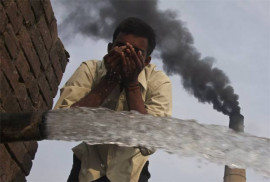
Still, the giant shadow cast by cricket cannot be ignored. And that’s where the year began, on a particularly depressing note, as the cricket team had just finished playing an ostensibly “home” series in New Zealand. With the terrorists have ensured a halt to international cricket being played in Pakistan, we faced the treacherous Kiwis in their own backyard and came out with a credible 1-1 drawn series.
Our very first Test match of the year, played against Australia after we had lost the first Test of the series to them at the end of December, encapsulated our year in cricket. Inspired fast bowling from Mohammad Asif put Pakistan in a situation where victory seemed guaranteed. Then, horrendous captaincy from Mohammad Yousuf, pathetic wicket keeping by Kamran Akmal and an abject last-innings batting collapse handed the Aussies a win that seemed unimaginable. Rumours of match-fixing and in-fighting started doing the rounds and we lost all our remaining matches on tour.
Just as the cricket team was unravelling, we had something to take our minds off the disaster Down Under. Sprinter Naseem Hameed won the gold medal in the 100 metres at the SAF Games in Dhaka. Hameed became our newest hero for the manner in which she handled the victory. She was feted by everyone from the President, who appointed her an Ambassador of Sport, to corporations, all of whom wanted her to endorse their product.
Meanwhile, the cricket team was experiencing a false dawn. As holders of the T20 World Championships, we were hoping the team could repeat their heroics, and for a while it seemed as if they would do just that. After an iffy start, the team regrouped to make it to the semis. And for much of the semifinal against Australia we were in a dominating mood. Only a once-in-a-career innings from Michael Hussey denied us victory. Still, it seemed as if we still had a knack for performing in our favourite format.
Onwards the cricket team marched to its nadir: a summer tour of England where we played Australia and the hosts. For much of the tour, it looked like a typically unpredictable Pakistani tour. Breathtaking fast bowling from the Mohammads Amir and Asif kept Pakistan in matches they had no right to be winning. Soon, oxymoronic though it may sound, there was a pattern to the unpredictability. Our batsman would collapse in an inept fashion while our fast bowlers, despite having fielders that were seemingly on the opposition batsmen’s side, would bring us back in it. This formula allowed us to draw our two-Test series against Australia and kept us in the hunt against England.
What happened next is wearily familiar to all fans of sport and it is territory too traumatic to retread. Suffice to say that a sting operation by a British tabloid seemed to implicate captain Salman Butt, Asif and Aamir in spot-fixing. Only after their case is heard in January 2011 will we have conclusive proof of their guilt but that ruined whatever momentum the team had built up. The end of the English tour couldn’t come too soon for jaded fans and a subsequent two-Test series against South Africa in the UAE desert was a dull run-fest.
How much lower could the Pakistani team plunge after the spot-fixing saga? Quite a bit, as we found out on the morning of the fifth and deciding One Day Innings against South Africa. Wicketkeeper Zulqarnain Haider, claiming he had received threats to his life, fled the Emirates and sought refuge in England. He hasn’t named any names yet but his hasty departure showed just how corrupt — and possibly dangerous — Pakistani cricket has become.
While the cricket shenanigans played out, tennis player Aisam ul Haq was quietly putting together a stellar year with doubles partner Rohan Boppana. It was only at the US Open that the self-styled Indo-Pak Express burst to public attention, reaching the finals before losing to the legendary Bryan brothers. Aisam also reached the mixed doubles finals, making this by far his best performance at a grand slam. As much as his play, it was Aisam’s demeanour that impressed, with his eloquent speeches after his two finals showing a man confident in himself and his mission.
Over at the Commonwealth Games, too, Pakistan was surprisingly successful. Its hockey team, for whom success has been sparing in recent year, took the gold and thus earned qualification to the 2012 Olympics. There were gold medals in squash and women’s cricket too.
This last year may have been among the most exhilarating and depressing in Pakistan’s sporting history. The law of averages states that next year should be a serene one but, as Pakistani cricketers have repeatedly shown, we have never followed laws of any kind.
The writer is a journalist based in Karachi.
Published in The Express Tribune, January 2nd, 2011.
This article has been revised to reflect the following correction:
Correction: January 04, 2011
An earlier version of this article incorrectly stated that Pakistan won medals in hockey, cricket and squash at the CommonWealth Games. The medals were won at the Asian Games.


1727177459-0/BeFunky-collage-(6)1727177459-0-165x106.webp)


1732697578-0/Untitled-design-(5)1732697578-0-270x192.webp)











COMMENTS (1)
Comments are moderated and generally will be posted if they are on-topic and not abusive.
For more information, please see our Comments FAQ